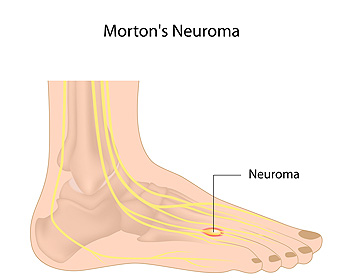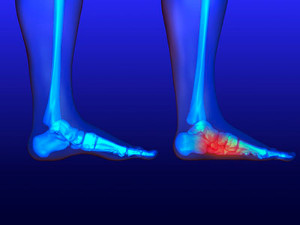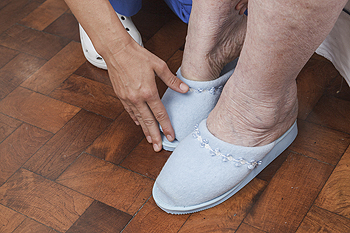May 2021
Signs and Causes of a Morton’s Neuroma
 When a nerve swells and becomes inflamed, it is known as a neuroma. Morton's neuroma occurs when this swelling and inflammation affects the nerve between the metatarsal bones of the third and fourth toes. When the nerves get trapped between these bones, pain usually occurs in the ball of the foot or the toes. Pain may become worse if tight fitting shoes are worn, such as high heels. Other symptoms include a burning, stabbing, or shooting pain, the feeling of a small stone stuck under the foot, or a tingling, numb feeling in the foot. Patients who are struggling with pain in the foot and believe it’s due to Morton's neuroma should consult with a podiatrist for proper diagnosis and treatment.
When a nerve swells and becomes inflamed, it is known as a neuroma. Morton's neuroma occurs when this swelling and inflammation affects the nerve between the metatarsal bones of the third and fourth toes. When the nerves get trapped between these bones, pain usually occurs in the ball of the foot or the toes. Pain may become worse if tight fitting shoes are worn, such as high heels. Other symptoms include a burning, stabbing, or shooting pain, the feeling of a small stone stuck under the foot, or a tingling, numb feeling in the foot. Patients who are struggling with pain in the foot and believe it’s due to Morton's neuroma should consult with a podiatrist for proper diagnosis and treatment.
Morton’s neuroma is a very uncomfortable condition to live with. If you think you have Morton’s neuroma, contact Gregory T. Loo, DPM of Elite Podiatry. Our doctor will attend to all of your foot care needs and answer any of your related questions.
Morton’s Neuroma
Morton's neuroma is a painful foot condition that commonly affects the areas between the second and third or third and fourth toe, although other areas of the foot are also susceptible. Morton’s neuroma is caused by an inflamed nerve in the foot that is being squeezed and aggravated by surrounding bones.
What Increases the Chances of Having Morton’s Neuroma?
- Ill-fitting high heels or shoes that add pressure to the toe or foot
- Jogging, running or any sport that involves constant impact to the foot
- Flat feet, bunions, and any other foot deformities
Morton’s neuroma is a very treatable condition. Orthotics and shoe inserts can often be used to alleviate the pain on the forefront of the feet. In more severe cases, corticosteroids can also be prescribed. In order to figure out the best treatment for your neuroma, it’s recommended to seek the care of a podiatrist who can diagnose your condition and provide different treatment options.
If you have any questions, please feel free to contact one of our offices located in Ahwatukee, and Phoenix, AZ . We offer the newest diagnostic and treatment technologies for all your foot care needs.
When to Visit the Doctor for Flat Feet
 Flat feet, also known as “fallen arches,” describe the feet pressing flat against the ground. To check to see if you have flat feet, check the inner sides of the feet while standing. If part of the foot is raised into an arch, then you don’t have flat feet. It is also important to know that most children under the age of 6 have flat feet and will develop an arch as they grow. While flat feet aren’t usually a big problem, there are some scenarios where consulting with a podiatrist can be beneficial. A podiatrist should check flat feet if they have become painful, stiff or numb, if the feet and ankles are frequently injured, if there are issues with balance and walking, if only one foot is flat, or if your feet have become flat in adulthood. A podiatrist can offer help finding the right footwear, exercises, and medications to treat your foot pain, and can determine if surgery may be needed.
Flat feet, also known as “fallen arches,” describe the feet pressing flat against the ground. To check to see if you have flat feet, check the inner sides of the feet while standing. If part of the foot is raised into an arch, then you don’t have flat feet. It is also important to know that most children under the age of 6 have flat feet and will develop an arch as they grow. While flat feet aren’t usually a big problem, there are some scenarios where consulting with a podiatrist can be beneficial. A podiatrist should check flat feet if they have become painful, stiff or numb, if the feet and ankles are frequently injured, if there are issues with balance and walking, if only one foot is flat, or if your feet have become flat in adulthood. A podiatrist can offer help finding the right footwear, exercises, and medications to treat your foot pain, and can determine if surgery may be needed.
Flatfoot is a condition many people suffer from. If you have flat feet, contact Gregory T. Loo, DPM from Elite Podiatry. Our doctor will treat your foot and ankle needs.
What Are Flat Feet?
Flatfoot is a condition in which the arch of the foot is depressed and the sole of the foot is almost completely in contact with the ground. About 20-30% of the population generally has flat feet because their arches never formed during growth.
Conditions & Problems:
Having flat feet makes it difficult to run or walk because of the stress placed on the ankles.
Alignment – The general alignment of your legs can be disrupted, because the ankles move inward which can cause major discomfort.
Knees – If you have complications with your knees, flat feet can be a contributor to arthritis in that area.
Symptoms
- Pain around the heel or arch area
- Trouble standing on the tip toe
- Swelling around the inside of the ankle
- Flat look to one or both feet
- Having your shoes feel uneven when worn
Treatment
If you are experiencing pain and stress on the foot you may weaken the posterior tibial tendon, which runs around the inside of the ankle.
If you have any questions please feel free to contact one of our offices located in Ahwatukee, and Phoenix, AZ . We offer the newest diagnostic and treatment technologies for all your foot and ankle needs.
It's Time for Beautiful Feet
How You Walk as an Older Adult Matters
 Keeping your body as strong as possible as you age goes a long way in helping you to maintain proper balance and reducing the risk of falling or adding undue stress on certain parts of your body. A podiatrist can do a physical examination of you and also conduct a gait analysis—which assesses the mechanics of how you walk and detects any irregularities which may negatively affect your balance and stride. Certain exercises, or specific treatments and therapies to correct gait abnormalities may be part of your wellness plan. With the help of a podiatrist, you can take the right steps in improving balance and strengthening muscles in the feet and legs to help you stay independent and mobile for as long as possible.
Keeping your body as strong as possible as you age goes a long way in helping you to maintain proper balance and reducing the risk of falling or adding undue stress on certain parts of your body. A podiatrist can do a physical examination of you and also conduct a gait analysis—which assesses the mechanics of how you walk and detects any irregularities which may negatively affect your balance and stride. Certain exercises, or specific treatments and therapies to correct gait abnormalities may be part of your wellness plan. With the help of a podiatrist, you can take the right steps in improving balance and strengthening muscles in the feet and legs to help you stay independent and mobile for as long as possible.
If you need your feet checked, contact Gregory T. Loo, DPM of Elite Podiatry. Our doctor will attend to all of your foot and ankle needs and provide you with quality treatment.
Geriatrics and Podiatry
When people age, some common issues that may occur are bone density loss, dry skin, poor circulation, and rough brittle nails. These issues may also affect your foot health if the necessary steps are not taken to alleviate the problems.
It is important to take care of your feet because feet that are injured or diseased can affect your overall health. Having painful feet hinders your ability to do daily activities or may decrease your willingness to do the things that you need to do.
Visiting Your Geriatrician
As we age, health problems become more likely, so it is essential to visit your doctor for check-ups to ensure that you are doing the best you can to take care of your health. It is recommended to check your feet frequently for any possible cuts, bruises, swelling, corns or any other irregularities.
Taking Care of Elderly Feet
Cracked or dry feet can be treated by applying moisturizer often. It is also important not to wear old socks because the older the sock is, the higher the possibility there will be that there is bacteria there. Wear fresh socks and make sure they fit properly.
Proper foot health means that you can have a more active lifestyle and you will not be bogged down by pain. Foot health also leads to good circulation, which is paramount for overall health.
If you have any questions, please feel free to contact one of our offices located in Ahwatukee, and Phoenix, AZ . We offer the newest diagnostic tools and technology to treat your foot and ankle needs.
Abnormalities in the Feet Can Indicate Other Issues
 While the feet have a variety of functions, issues with the feet can also indicate issues in a variety of other parts of the body. Because of this, podiatrists can often be the first doctors to notice an issue. For example, feet that are too cold, or are blue in color, can indicate circulation problems in the rest of the body. Swollen feet can sometimes indicate heart disease or high blood pressure. The toenails can also indicate a variety of issues. Changes in toenail color can be signs of issues in the lungs, heart, kidneys, or liver, and it can even be a sign of diabetes or an infection. If you are noticing any abnormalities in the feet, consult with a podiatrist to make sure there aren’t any underlying issues.
While the feet have a variety of functions, issues with the feet can also indicate issues in a variety of other parts of the body. Because of this, podiatrists can often be the first doctors to notice an issue. For example, feet that are too cold, or are blue in color, can indicate circulation problems in the rest of the body. Swollen feet can sometimes indicate heart disease or high blood pressure. The toenails can also indicate a variety of issues. Changes in toenail color can be signs of issues in the lungs, heart, kidneys, or liver, and it can even be a sign of diabetes or an infection. If you are noticing any abnormalities in the feet, consult with a podiatrist to make sure there aren’t any underlying issues.
When dealing with systemic disease of the feet, it is extremely important to check the affected areas routinely so that any additional problems are caught quickly. If you have any concerns about your feet and ankles contact Gregory T. Loo, DPM from Elite Podiatry. Our doctor will assist you with all of your podiatric needs.
Systemic Diseases of the Feet
Systemic diseases affect the whole body, and symptoms usually are displayed in the feet. This condition can make a patient’s ability to walk unbearable. Systemic diseases include gout, diabetes mellitus, neurological disorders, and arthritis.
Gout – is caused by an excess of uric acid in the body. Common symptoms include pain, inflammation, and redness at the metatarsal/phalangeal joint of the base big toe. Gout can be treated by NSAIDs to relieve pain and inflammation, and other drugs that lower the acid levels in the body.
Diabetes mellitus – is an increase in the level of blood sugar that the body cannot counteract with its own insulin. Failure to produce enough insulin is a factor in Diabetes.
Diabetes of the Feet
Diabetic Neuropathy – may lead to damaged nerves and affect the feet through numbness and loss of sensation.
Peripheral Vascular Disease – can restrict the blood flow to the feet, and often times lead to amputation of the feet.
If you have any questions please feel free to contact one of our offices located in Ahwatukee, and Phoenix, AZ . We offer the newest diagnostic and treatment technologies for all your foot and ankle needs.










